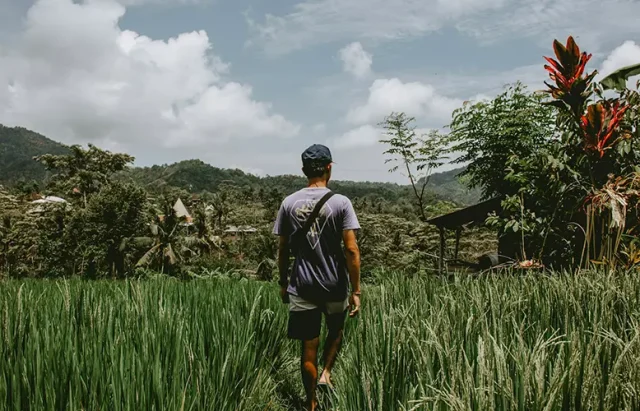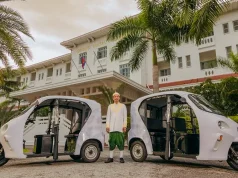
You’ve decided that you want to plan an exciting travel experience, but along the way, you want to do all you can to reduce your carbon footprint and impact on the planet. That’s great news, of course!
But now let’s set the scene. You’ve spent hours and hours researching your destination and looking at the most eco-friendly ways to travel and things to do there.
You’re even planning on shipping your luggage ahead of time using a carbon-neutral route, so you can fly economy with a more environmentally friendly airline and not have to worry about paying extra for luggage.
And let’s face it, you don’t love dragging your bags about with you at the best of times.
You’ve also got your reusable water bottle, bamboo toothbrush, refillable toiletries and deodorant in your tote bag. You are ready to go!
Now imagine after all the effort you’ve put in, you arrive at your lovely hotel, only to realise that it is an environmental nightmare. The towels are washed every day, the food waste is criminal and the lights seem to be on 24/7.
Unfortunately, far too many travellers will not give enough thought to this important part of their trip.
But if you want to plan a more eco-friendly getaway, accommodation will play a huge role in this. So, in the guide below, we’re going to share with you our top tips for finding more eco-friendly accommodation and reducing your carbon footprint this year.
Consider going camping (or even glamping)
Is there anything more incredible than waking up with the sun beaming down on you, surrounded by nature, popping your head out of the tent and breathing in that fresh morning air?
We don’t think so.
Camping can be a great way to massively slash your footprint, particularly when compared to conventional hotel stays. For one thing, you will use fewer natural resources and for another, you can take the bare essentials with you and rely more heavily on your own reusable items.
But in case you’re worried that camping isn’t really for you, the great news is there are loads of different options. From the real basic tent and roll mat in your backpack to glamping and eco-pods, you can choose a style of camping that best suits you.
Just be sure that if you go for one of the more high-end glamping options you choose somewhere that is still eco-friendly. For example, look for somewhere that built their tents out of sustainable material or actively tries to reduce waste on the site.
The same applies to any campsite you choose. You should always do your research first to ensure they are meeting sustainability standards by reducing waste, providing recycling points, etc. and doing their bit for the planet.
Choose your hotels wisely
If you want a comfy room with a big bed and a private bathroom with a tub, you might think you have to pay to stay in a 5-star hotel, but that’s simply not the case. Shopping around can help you to find more budget and planet-friendly options, whilst still ensuring a luxurious stay.
After all, luxury hotels have a dark side that includes a lot of food waste and single-use plastic. What’s more, according to the World Wildlife Fund, the average five-star hotel can expend a staggering 1.5 million gallons of water every month. That is 111% more than your average 3-star hotel.
So keep that in mind next time you’re booking and make sure to do your research. A lower number of stars doesn’t automatically equate to a bad hotel, you just have to be selective and shop around a bit to find the right accommodation.
Live like a local
Why not go one step further than a hotel and look for a gorgeous private room in someone’s home or rented property? For example, there are lots of wonderful little flats, barn conversions, huts and more listed online for keen travellers to rent.
Alternatively, you can get really into the local life by finding a home or farm stay where you can live and even work with local families or fellow travellers. This can be a wonderful way to truly experience your destination, to get to know people and to give back to the local community.
After all, why spend money on a huge hotel chain that doesn’t need it, when you can support a lovely local family and have a much more unique travel experience? One that is far better for the planet as well.
Seek out eco-certified destinations
The drive towards more sustainable travel (and life in general) has seen a boom in eco-certified accommodation. So, if you really want to be sure you are reducing your carbon footprint, think about booking an eco-stay.
There are websites specifically dedicated to these accommodations, such as Ecobnb, Cool Places and Host Unusual. This makes it possible for you to easily search your destination and find some of the best stays out there in the sustainable tourism community.
This could include everything from purpose-built eco-hotels to tree houses, safari camps, cabins and everything in between. These places are popping up all over the world and trying to make a difference, so take a look at what’s out there.
Make sure that these facilities practice what they preach
The final point we are going to leave you with is making sure that no matter where you go, the facilities always practise what they preach. If your accommodation has been advertised as a sustainable or eco-friendly destination, make sure that they are keeping to their environmental commitments.
You will often be able to see reviews before you go as to whether or not these are legitimate places. But unfortunately, the word ‘sustainable’ has been somewhat hijacked and overused by industries hoping to sell goods to an eco-conscious audience.
So, if you go somewhere and you don’t believe they are meeting the standards they have set out for themselves and their guests, be sure to leave reviews and let other travellers know. You should also speak to them about how they can do better in the future.





